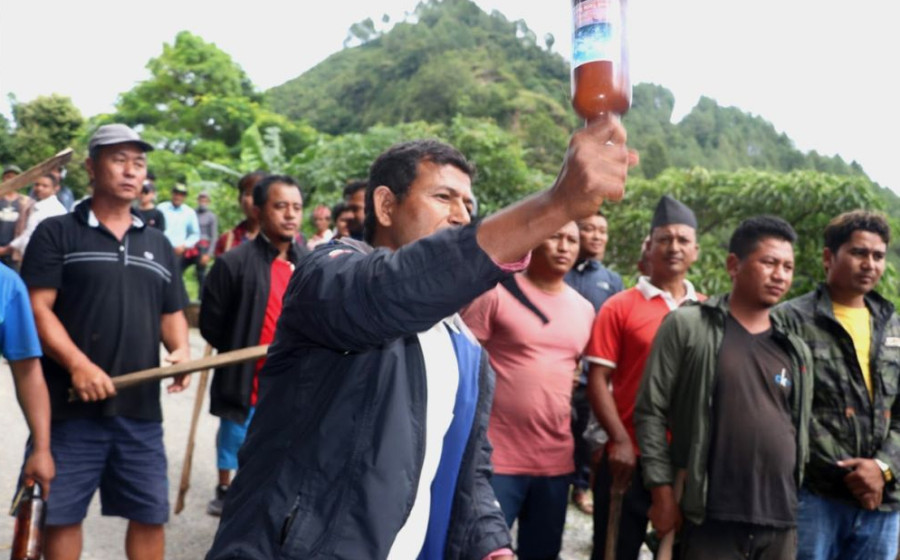Editorial
The government and the ruling party must dial down on the authoritarian behaviour
The Oli-administration would do well to remember that the people democratically elected it to uphold the rule of law.
Hooliganism and mob mentality is terrible. But what is even worse is the state’s silence, or actual support, of such despicable behaviour. While Nepal is not new to parties in power criticising voices of dissent, never has a ruling party been so weak in controlling its own cadre engaging in violent and suppressive attacks. The intimidation and condemnation of activist Gyanendra Shahi by the cadres and the youth wings of the ruling party in the past few weeks, and the brutal attack on him last Saturday has seen no censure from the government. Moreover, Nepali Congress leader Minendra Rijal was also physically blocked from attending a function in Tanahun by the ruling party workers. Is the Nepal Communist Party truly so disorganised and weak that it cannot control its own cadres and its youth wings? So scared of its grassroots that it has to remain mute when such attacks occur? Or is it staying silent on purpose? After all, this is not the first time the Nepal Communist Party has shown an affinity for authoritarian measures.
The erstwhile CPN-UML used to be a party that took every major decision through consultations and many rounds of deliberations through various party committees. However, ever since the rise of KP Oli into the party leadership—and more so after the merger with the Communist Party of Nepal (Maoist Centre)—the ruling party has been lambasted for being more authoritarian. This is something even party insiders have felt. Oli became prime minister for the second time in 2018. This time, as the leader of a soon-to-be-merged party with a near two-thirds majority in the federal Parliament and with ruling governments in six out of the seven provinces. Since then, perhaps buoyed by a false sense of security from the majority, and inspired by its authoritarian leader, the Nepal Communist Party has made a number of undemocratic missteps. The attempted push-through of the infamous Guthi Bill, the Media Council Bill, and the IT Management Bill are cases in point. Government agencies have also misused loopholes in the law to stifle free speech. The Pranesh Gautam fiasco—in which the comedian was jailed for posting an uncomplimentary film review on the internet—and the police’s use of provisions in the Electronic Transaction Act to punish him is an example of such abuse of power.
The government seems to be criticised for leaning towards authoritarianism on a regular basis. But its own actions keep reinforcing this mistrust among the people. And the ruling party’s leaders rarely admit to any wrongdoing unless cornered by widespread unrest. The tourism minister’s response to the Buddha Air flight delay, and Gyanendra Shahi’s verbal attacks, seemed too insincere and condescending. Pushpa Kamal Dahal has been repeatedly criticised for his anti-democratic quips, the most recent one being the remark criticising free speech on social media. And the government spokesperson, Communications Minister Gokul Baskota, has on numerous occasions been criticised for forgetting his own career in journalism and supporting the Oli-administration’s unilateral decision making. These are just a few examples of the ruling party and the administration’s anti-democratic leanings.
But the recent attacks on Shahi and Rijal have taken things too far. To bar a member of the opposition from attending a programme is a disgrace. To have cadres and student-affiliates threaten a citizen—imposing ‘bans’ on his movements into certain districts—is a slap in the face of democracy. Whether Nepal Communist Party cadres were behind Shahi’s beating or not, the government must leave no stone unturned to bring the culprits to book. Moreover, it must come out and condemn the words and actions of its party members. The Nepal Communist Party would do well to remember that the people democratically elected it to uphold the rule of law; Nepalis will not accept fascist incidents.
***
What do you think?
Dear reader, we’d like to hear from you. We regularly publish letters to the editor on contemporary issues or direct responses to something the Post has recently published. Please send your letters to [email protected] with "Letter to the Editor" in the subject line. Please include your name, location, and a contact address so one of our editors can reach out to you.




 13.12°C Kathmandu
13.12°C Kathmandu














